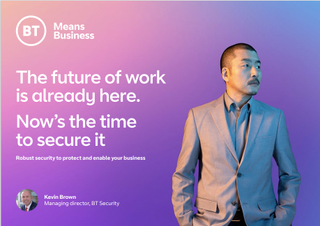Microsoft urges businesses to overcome 'paranoid' remote working hangups
Business leaders are missing genuine signals of productivity in favour of meaningless cues like people showing their faces in the office

Microsoft has called on businesses to “end productivity paranoia” with remote working and instead help staff to prioritise their work.
The advisory forms part of the tech giant’s latest Work Trend Index report, which surveyed 20,000 people across 11 countries and analysed “trillions” of Microsoft 365 productivity signals, along with LinkedIn and Glint People Science findings.
It found that, despite anxieties over a mobile workforce, most people are working better than ever. In fact, 87% of employees report they are productive at work, with Microsoft 365 productivity signals also continuing to climb.
The number of meetings held per week has increased by 153% for the average Microsoft Teams user since the start of the pandemic, with users now “flooded with meeting invites”.
However, the report found that 85% of business leaders still say they find it challenging to have confidence in staff productivity when remote working. Organisations that track activity, rather than impact, are also undermining trust, leading to what Microsoft calls “productivity theatre”.
“This has led to productivity paranoia: where leaders fear that lost productivity is due to employees not working, even though hours worked, number of meetings, and other activity metrics have increased,” Microsoft added. “Many leaders and managers are missing the old visual cues of what it means to be productive because they can’t “see” who is hard at work by walking down the hall or past the conference room.”
Nearly half (49%) of hybrid managers reported struggling to trust their employees to do their best work, compared with 36% of in-person managers. The result is soaring digital overwhelm, with employees continuously feeling the pressure to prove they’re working.
Get the ITPro. daily newsletter
Receive our latest news, industry updates, featured resources and more. Sign up today to receive our FREE report on AI cyber crime & security - newly updated for 2024.
“Productivity paranoia risks making hybrid work unsustainable,” Microsoft continued. “Leaders need to pivot from worrying about whether their people are working enough to helping them focus on the work that’s most important.”

The future of work is already here. Now’s the time to secure it.
Robust security to protect and enable your business
The report also concluded that companies should look to re-recruit and re-onboard their employees, with staff increasingly leaving if they feel they can’t learn new skills and develop.
Leaders must adapt to the growing trends of workers turning to job-hopping, the creator economy, side hustles, and entrepreneurship. The data shows that 77% of Gen Z and Millennial workers would stay at their employer longer if they were allowed the flexibility to pursue side projects for additional income, while 52% said they were likely to leave their role within a year.
“Rather than ignore or fight these trends, the best leaders will prioritise learning and development to help both people and the business grow,” Microsoft said.
Elsewhere, the report found people mostly returning to the office for social contact, with 84% of employees saying they’d be motivated by the promise of socialising with coworkers. The majority (73%) of surveyed staff said they need a better reason to return to the office than simply company expectations.
Dan is a freelance writer and regular contributor to ChannelPro, covering the latest news stories across the IT, technology, and channel landscapes. Topics regularly cover cloud technologies, cyber security, software and operating system guides, and the latest mergers and acquisitions.
A journalism graduate from Leeds Beckett University, he combines a passion for the written word with a keen interest in the latest technology and its influence in an increasingly connected world.
He started writing for ChannelPro back in 2016, focusing on a mixture of news and technology guides, before becoming a regular contributor to ITPro. Elsewhere, he has previously written news and features across a range of other topics, including sport, music, and general news.





